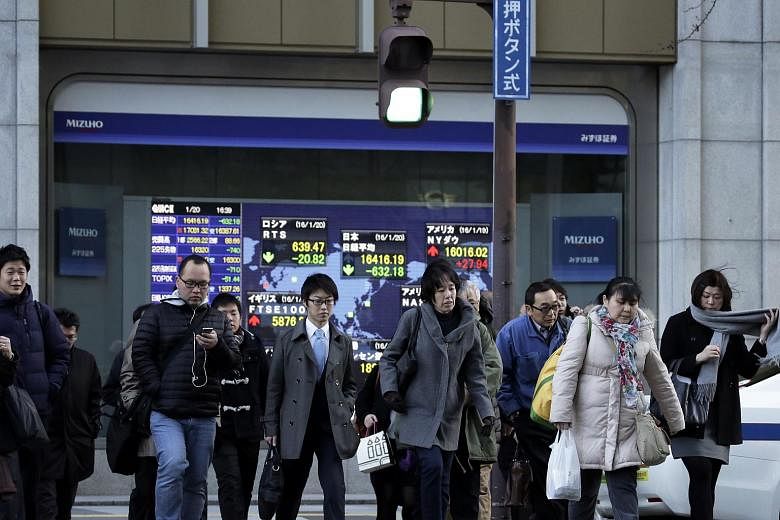SINGAPORE (REUTERS) - Some investors who mistakenly sensed a bottom in Asian markets in late 2015 will be shy to see one now, though others could feel this year's tumbles have made valuations attractive enough to come back in.
In October, there was sustained buying, as Asian valuations the previous month were at 6-1/2 year lows and outflows from the region signalled a bottom was near. The rally was tantalizing but brief, as slowing Chinese growth, its weaker currency and falling oil prices combined to end it.
Many investors have been spooked by how much prices were pushed down this month, which knocked confidence in how much fundamentals matter.
"There is currently very negative sentiment towards Asian stock markets," said Peter Sartori, head of Asian equities at Nikko Asset Management.
But to him, the falls have created an opening, as valuations remain close to last year's record lows.
"At times like these, taking a long-term view, there is a real opportunity to get exposure to the best Asian companies at very attractive levels," he said.
On Friday, Asian stocks rebounded, but the benchmark MSCI Asia Pacific ex-Japan index is still down more than 10 per cent in the first three weeks of 2016 and off 30 per cent from an April peak. Japan's Nikkei 225, which last week briefly entered bear market territory, recovered on Friday to be down 19 percent from a June peak.
The broader Asian benchmark has been hovering around 1.4 times book value since August - its lowest since the 1.3 times range seen in 2009. In 1998, at its lowest during the Asian financial crisis, it was 1.12 times.
And although Asia-Pacific has challenges such as high debt levels, weakening currencies and slowing growth, the region is still growing faster than major developed markets and many other emerging economies.
Analysts and investors are also expecting Asia-Pacific ex-Japan earnings per share to grow a respectable 6-8 per cent in 2016.
"Fundamentals aren't great but they don't look that bad, but valuations are close to 2009 and Asian financial crisis levels,"said Josh Crabb, head of Asian equities at Old Mutual Global Investors. "This doesn't look like a weak demand environment; it's more like a financial collapse-type environment."
China's slowdown has been under way for some time and has long been expected, as it is in transition from an export-driven economy to a consumption-led one - a huge challenge but something that would be a long-term positive if Beijing can pull it off.
Investors are giving Chinese authorities' efforts to rebalance the economy "no benefit of doubt whatsoever," said Sartori of Nikko Asset Management.
He also said investors are "ignoring the fact that low commodity and energy prices are a net positive for most of Asia".
Spooked investors flocking to the safety of the US dollar are making things worse for Asian markets by exacerbating capital outflows.
While brief rallies are possible as short-sellers cover positions, "because of slowing growth and potentially weaker currencies, it is difficult to sustain the rebound," said Ken Peng, Asia Pacific investment strategist at Citi Private Bank.
Hugh Young, managing director of Aberdeen Asset Management in Singapore, wrote on Thursday that his firm's "contrarian instincts" has its fund managers starting to get excited again.
"Those of us who have been around a while have seen this all before and we know that Asia will pull through and emerge even stronger," he said.

